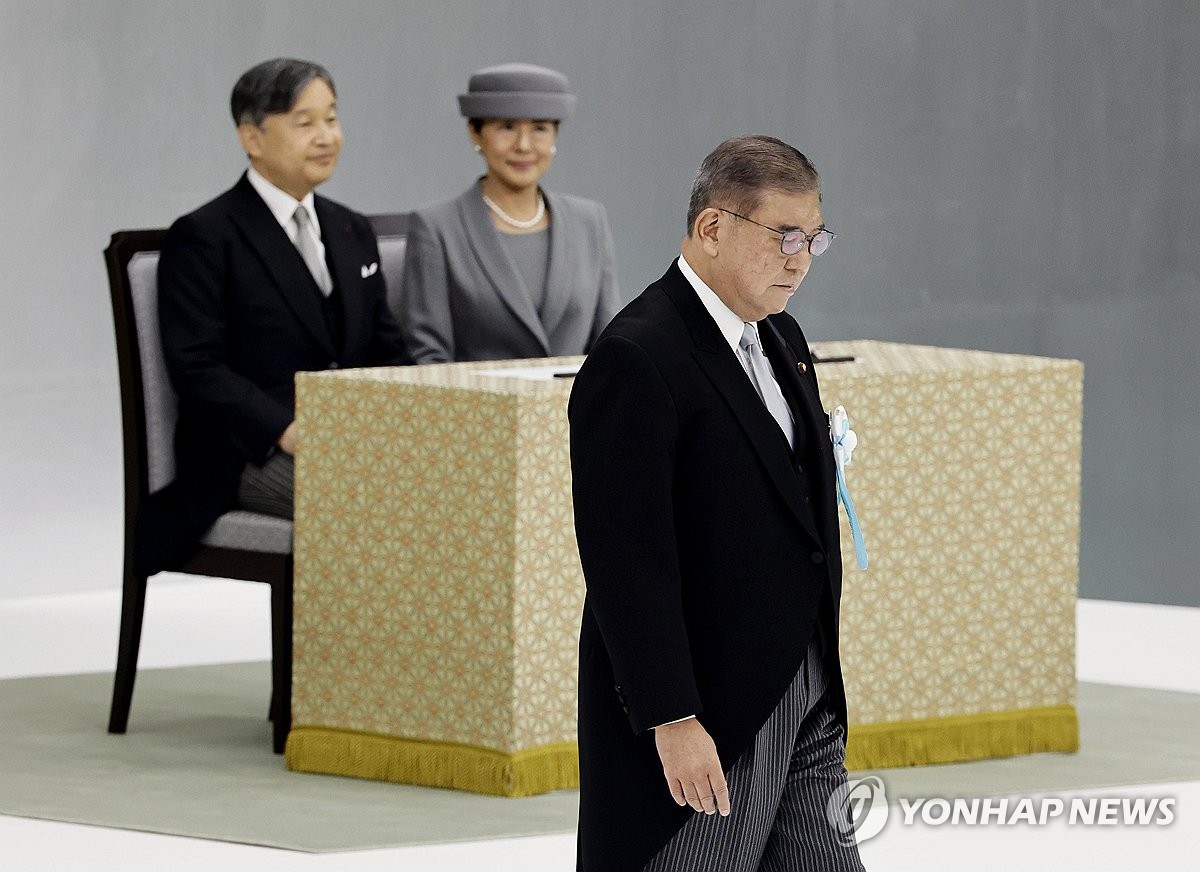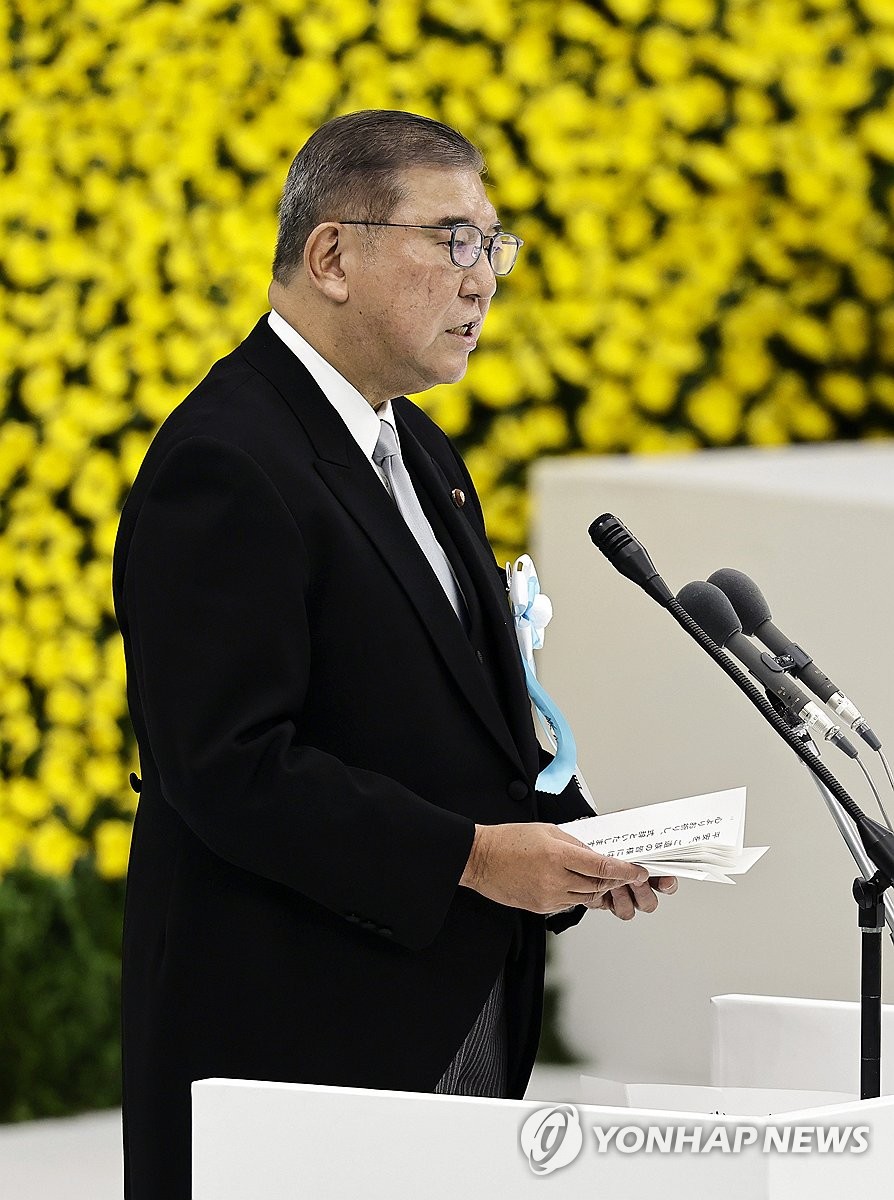Ishiba:"We must reflect on the war and re-evaluate its lessons." It's difficult to evaluate this as a reflection on colonial rule.
(Tokyo = Yonhap News) Correspondent Kyung Soo-hyun = The Japanese Prime Minister mentioned 'reflection' for the first time in 13 years in his memorial speech for the fallen on the anniversary of the Japanese defeat.
However, some point out that it is difficult to evaluate this as a reflection on a neighboring country that was ruled as a colony, as the expressions"invasion" and "harm" that Japanese prime ministers used together with "reflection" until 2012 were omitted.

Prime Minister Shigeru Ishiba said in his speech at the National Memorial Ceremony for the War Dead held at the Nippon Budokan in Tokyo on the 15th, the 80th anniversary of Japan's defeat,"We will never repeat the tragedy of war," and "We must now once again engrave the reflections and lessons of that war deep in our hearts."
He emphasized,"For the past 80 years, our country (Japan) has consistently walked as a peaceful nation and has worked for world peace and prosperity."
It has been 13 years since the Japanese Prime Minister mentioned the word "reflection" in his memorial speech for the war dead.
However, it did not directly mention the neighboring countries that were colonized by Japan's war of aggression as objects of reflection.
Prime Minister Ishiba has been critical of Japan's decision to wage war without civilian control.
Past Japanese prime ministers have mentioned the damage suffered by neighboring countries and expressed remorse on the anniversary of Japan's defeat, but this practice was discontinued after Prime Minister Shinzo Abe returned to office in December 2012.
Former Prime Minister Morihiro Hosokawa first mentioned the damage suffered by other countries as a result of Japan's war of aggression on the anniversary of Japan's defeat in 1993.
Prime Minister Hosokawa said at the memorial service for the war dead,"I express my deepest condolences to all the victims of war and their bereaved families around the world, including neighboring countries in Asia, across borders."
In 1994, then-Prime Minister Tomiichi Murayama said,"This has caused tragic sacrifices that cannot be expressed in words to many people around the world, including in Asia," and "I would like to express my deepest regret and condolences."
However, on August 15, 2013, the first day of defeat after former Prime Minister Abe returned to power, he did not acknowledge the damage Japan had caused to other countries or express any remorse. Since then, expressions of harm and remorse have disappeared, and former Prime Ministers Yoshihide Suga and Fumio Kishida have effectively continued this practice.
Accordingly, only the Emperor of Japan has mentioned 'reflection' at memorial services for the war dead.
Emperor Naruhito also mentioned"reflection" at the memorial service that day, using the same phrase as last year:"Looking back on the past, standing on the foundation of deep reflection, I earnestly hope that the tragedy of war will never be repeated."

Meanwhile, Prime Minister Ishiba did not release a statement following the Cabinet meeting that day.
Chief Cabinet Secretary Yoshimasa Hayashi, the Japanese government spokesperson, said only at a regular press conference,"The Ishiba Cabinet has inherited and will continue to inherit the positions of previous cabinets on historical awareness, including the Prime Minister's statement."
Prime Minister Ishiba originally considered issuing a speech on the 80th anniversary of the defeat in World War II, but decided to postpone it due to opposition from conservative forces within the ruling Liberal Democratic Party, including the former Abe faction.
He is said to be considering sending a separate personal message in the future, but this too remains unclear due to opposition from conservative forces within the party.
Beginning in 1995, 50 years after the war, Japanese prime ministers held cabinet meetings and issued speeches at 10-year intervals around the end of the war.
Former Prime Minister Murayama expressed apology and reflection for colonial rule in his 50th anniversary statement, and former Prime Minister Junichiro Koizumi expressed apology and reflection for colonial rule in his 60th anniversary statement.
Former Prime Minister Abe also stated in his 70th anniversary speech in 2015 that “our country has repeatedly expressed deep reflection and heartfelt apology for its actions during the past war,” and that we should not apologize in the “past tense” and expect future generations to continue to apologize.

